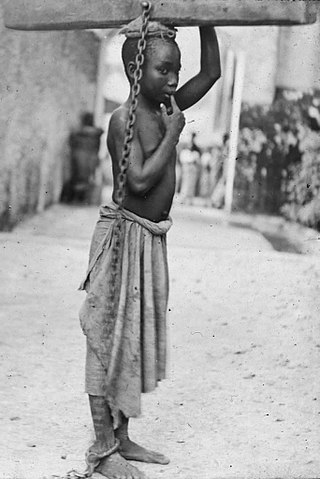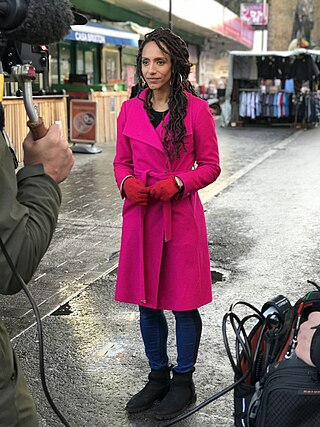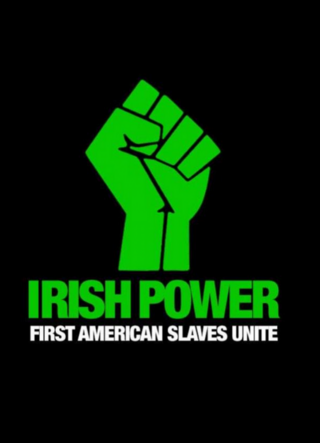Related Research Articles

The Underground Railroad was a network of secret routes and safe houses established in the United States during the early to mid-19th century. It was used by enslaved African Americans primarily to escape into free states and from there to Canada. The network, primarily the work of free African Americans, was assisted by abolitionists and others sympathetic to the cause of the escapees. The slaves who risked capture and those who aided them are also collectively referred to as the passengers and conductors of the "Underground Railroad". Various other routes led to Mexico, where slavery had been abolished, and to islands in the Caribbean that were not part of the slave trade. An earlier escape route running south toward Florida, then a Spanish possession, existed from the late 17th century until approximately 1790. However, the network generally known as the Underground Railroad began in the late 18th century. It ran north and grew steadily until the Emancipation Proclamation was signed by President Abraham Lincoln. One estimate suggests that, by 1850, approximately 100,000 slaves had escaped to freedom via the network.

Abolitionism, or the abolitionist movement, is the movement to end slavery and liberate enslaved people around the world.

The Atlantic slave trade or transatlantic slave trade involved the transportation by slave traders of enslaved African people, mainly to the Americas. The outfitted European slave ships of the slave trade regularly used the triangular trade route and its Middle Passage, and existed from the 16th to the 19th centuries. The vast majority of those who were transported in the transatlantic slave trade were from Central and West Africa who had been sold by West African slave traders mainly to Portuguese, British, Spanish, Dutch, and French slave traders, while others had been captured directly by the slave traders in coastal raids; European slave traders gathered and imprisoned the enslaved at forts on the African coast and then brought them to the Americas. Except for the Portuguese, European slave traders generally did not participate in the raids because life expectancy for Europeans in sub-Saharan Africa was less than one year during the period of the slave trade.

Olaudah Equiano, known for most of his life as Gustavus Vassa, was a writer and abolitionist. According to his memoir, he was from the village of Essaka in modern southern Nigeria. Enslaved as a child in West Africa, he was shipped to the Caribbean and sold to a Royal Navy officer. He was sold twice more before purchasing his freedom in 1766.

Simcha Jacobovici is a Canadian-Israeli journalist, New York Times best-selling author and documentary filmmaker.

500 Years Later is a 2005 independent documentary film directed by Owen 'Alik Shahadah and written by M. K. Asante, Jr. It has won five international film festival awards in the category of Best Documentary, including the UNESCO "Breaking the Chains" award. It has won other awards including Best Documentary at the Pan African Film Festival in Los Angeles, Best Documentary at the Bridgetown Film Festival in Barbados, Best Film at the International Black Cinema Film Festival in Berlin, and Best International Documentary at the Harlem International Film Festival in New York.

The history of slavery spans many cultures, nationalities, and religions from ancient times to the present day. Likewise, its victims have come from many different ethnicities and religious groups. The social, economic, and legal positions of slaves have differed vastly in different systems of slavery in different times and places.

The International Slavery Museum is a museum located in Liverpool, UK, that focuses on the history and legacy of the transatlantic slave trade. The museum which forms part of the Merseyside Maritime Museum, consists of three main galleries which focus on the lives of people in West Africa, their eventual enslavement, and their continued fight for freedom. Additionally the museum discusses slavery in the modern day as well as topics on racism and discrimination.

Slavery in Britain existed before the Roman occupation and until the 11th century, when the Norman conquest of England resulted in the gradual merger of the pre-conquest institution of slavery into serfdom, and all slaves were no longer recognised separately in English law or custom. By the middle of the 12th century, the institution of slavery as it had existed prior to the Norman conquest had fully disappeared, but other forms of unfree servitude continued for some centuries.

Afro-Iranians are Iranian people of African Zanj heritage. Most Afro-Iranians are concentrated in the coastal provinces of Persian Gulf such as Hormozagan, Sistan and Baluchestan, Bushehr and Khuzestan.

Unchained Memories: Readings from the Slave Narratives is a 2003 American documentary film about the stories of former slaves interviewed during the 1930s as part of the Federal Writers' Project and preserved in the WPA Slave Narrative Collection. This HBO film interpretation directed by Ed Bell and Thomas Lennon is a compilation of slave narratives, narrated by actors, emulating the original conversation with the interviewer. The slave narratives may be the most accurate in terms of the everyday activities of the enslaved, serving as personal memoirs of more than two thousand former slaves. The documentary depicts the emotions of the slaves and what they endured. The "Master" had the opportunity to sell, trade, or kill the enslaved, for retribution should one slave not obey.
Ric Esther Bienstock is a Canadian documentary filmmaker best known for her investigative documentaries. She was born in Montreal, Quebec and studied at Vanier College and McGill University. She has produced and directed an eclectic array of films from investigative social issue documentaries like Sex Slaves, an investigation into the trafficking of women from former Soviet Bloc Countries into the global sex trade and Ebola: Inside an Outbreak which took viewers to ground zero of the Ebola outbreak in Zaire - to lighter fare such as Penn & Teller’s Magic and Mystery Tour.

Afua Hirsch is a British writer and broadcaster. She has worked as a journalist for The Guardian newspaper, and was the Social Affairs and Education Editor for Sky News from 2014 until 2017. She is the author of the 2018 book Brit(ish): On Race, Identity and Belonging, receiving a Jerwood Award while writing it.

Reparations for slavery is the application of the concept of reparations to victims of slavery and/or their descendants. There are concepts for reparations in legal philosophy and reparations in transitional justice. Reparations can take many forms, including practical and financial assistance to the descendants of enslaved people, acknowledgements or apologies to peoples or nations negatively affected by slavery, or honouring the memories of people who were enslaved by naming things after them.

The Centre for the Study of the Legacies of British Slavery, formerly the Centre for the Study of the Legacies of British Slave-ownership, is a research centre of University College, London (UCL) that focuses on revealing the impact of British slavery and, in particular, the implications of the Slave Compensation Act 1837. The Centre's work is freely available online to the public through the Legacies of British Slavery database.

David Adetayo Olusoga is a British historian, writer, broadcaster, presenter and filmmaker. He is Professor of Public History at the University of Manchester. He has presented historical documentaries on the BBC and contributed to The One Show and The Guardian.

The Irish slaves myth is a fringe pseudohistorical narrative that conflates the penal transportation and indentured servitude of Irish people during the 17th and 18th centuries, with the hereditary chattel slavery experienced by the forebears of the African diaspora. Some white nationalists, and others who want to minimize the effects of hereditary chattel slavery on Africans and their descendants, have used this false equivalence to deny racism against African Americans or claim that African Americans are too vocal in seeking justice for historical grievances. It also can hide the facts around Irish involvement in the transatlantic slave trade. The myth has been in circulation since at least the 1990s and has been disseminated in online memes and social media debates. According to historians Jerome S. Handler and Matthew C. Reilly, "it is misleading, if not erroneous, to apply the term 'slave' to Irish and other indentured servants in early Barbados". In 2016, academics and Irish historians wrote to condemn the myth.

The history of slavery in Colorado began centuries before Colorado achieved statehood when Spanish colonists of Santa Fe de Nuevo México (1598–1848) enslaved Native Americans, called Genízaros. Southern Colorado was part of the Spanish territory until 1848. Comanche and Utes raided villages of other indigenous people and enslaved them.
References
- ↑ Ahearn, Victoria (16 October 2020). "Canadian director and Samuel L. Jackson probe transatlantic slave trade in 'Enslaved'". CP24 .
- 1 2 Thorne, Will (4 August 2020). "Samuel L. Jackson Docuseries 'Enslaved' Sets Premiere Date on Epix". Variety .
- ↑ Harker, Joseph (11 October 2020). "Enslaved review – Samuel L Jackson presents a brutally poignant history of the slave trade". The Guardian .
- ↑ Vincent, Melissa (18 October 2020). "Documentary epic Enslaved, starring Samuel L. Jackson, tells a story that is 400 years overdue". The Globe and Mail .
- 1 2 Alcinii, Daniele (21 August 2020). "BBC2 acquires Samuel L. Jackson slavery series 'Enslaved'". RealScreen .
- ↑ Delaney, Caroline (30 January 2021). "Saturday TV Tips: Samuel L Jackson looks at 400 years of human trafficking from Africa". Irish Examiner.
- ↑ West, Rachel (17 May 2021). "'Canada's Drag Race', 'Property Brothers', Jann Arden Among Canadian Screen Awards Lifestyle And Reality Winners". ET Canada . Archived from the original on 18 May 2021. Retrieved 28 September 2023.